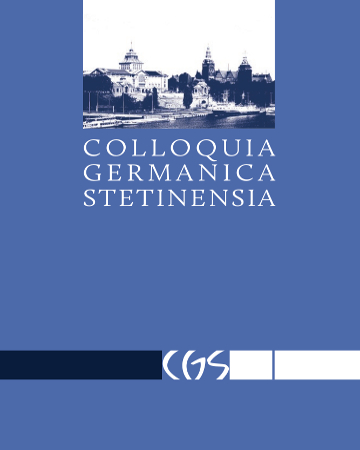







| Year of publication: | 2023 |
| # | Title | Page range | Authors | Actions |
|---|---|---|---|---|
| * |
Redaktionsseite(Editorial page) |
2 (1-2) | --- | More |
| * |
Inhaltsverzeichnis(Table of contents) |
2 (3-4) | --- | More |
| 1. |
„Aber was ist als Ganzes überhaupt darstellbar?“ Zum literarischen Schaffen von Erica Pedretti (1930–2022)(“But what is actually representable as a whole?” On the Literary Work of Erica Pedretti (1930–2022)) |
20 (5-24) | Daniel Rothenbühler | More |
| 2. |
Die imaginierten Abenteuer eines Mönchs. E.T.A. Hoffmanns "Die Elixiere des Teufels" als Ausdruck romantischer Unsicherheit(The imagined adventures of a monk. E.T.A. Hoffmann's "Die Elixiere des Teufels" as an expression of romantic uncertainty) |
16 (25-40) | Magda Jaglewicz | More |
| 3. |
Liebe als Flucht: Metaphorische und allegorische Sinnschichten in Gertrud Leuteneggers Roman „Späte Gäste“ (2020)(Love as escape: metaphorical and allegorical sense layers in the novel “Späte Gäste” of Gertrud Leutenegger) |
28 (41-68) | Daniel Annen | More |
| 4. |
„In meinen Träumen seh ich eine Stadt zum Leben“. Heimat im Spannungsfeld von ‚gesundem Menschenverstand‘ und der Sehnsucht nach der ‚alten Welt‘ in Juli Zehs dystopischem Roman "Corpus Delicti. Ein Prozess"(“In my dreams I see a city to live in”. ‘Heimat’ in the tension between ‘common sense’ and the longing for the ‘old world’ in Juli Zeh's dystopian novel "Corpus Delicti. Ein Prozess") |
22 (69-90) | Aleksandra Burdziej | More |
| 5. |
Eingrenzung durch Sprache und Identität bei Michael Zeller in "Die Reise nach Samosch" und bei Stephan Wackwitz in "Ein unsichtbares Land"(Restrainting by language and identity in the novels by Michael Zeller – "Die Reise nach Samosch" and Stephan Wackwitz – "Ein unsichtbares Land") |
16 (91-106) | Jan Kubica | More |
| 6. |
Die Scham der Einwanderer. Facetten einer schmerzvollen Emotion in der deutschen Migrationsliteratur mit polnischem Hintergrund(The shame of immigrants. Facets of a painful emotion in German literature on migration with a Polish background) |
17 (107-123) | Dorota Masiakowska-Osses | More |
| 7. |
Der grobe Pommer: über die Pommern, ein Stereotyp und eine Anekdote(The Rude Pomeranian: About a Stereotype, an Anecdote and the Pomeranians) |
29 (125-153) | Bartosz Wójcik | More |
| 8. |
„Chagallisch“: Zur Ästhetik der Luft in lyrischen Texten(„Chagallisch“: On the aesthetics of air in lyrical texts) |
25 (155-179) | Monika Szczepaniak | More |
| 9. |
Einfache Formen – Mythologische Redensarten – Die Lebendigkeit der Idiome(Simple Forms – Mytological proverbial expressions – The liveness of idioms) |
20 (181-200) | Barbara Komenda-Earle | More |
| 10. |
Emotionen in medialen Diskursen am Beispiel von Memes(Emotions in media discourses on the example of memes) |
19 (201-219) | Sławomir Kowalewski, Laura Kowalska | More |
| 11. |
Der Tod als Tabu oder der Tod beim Namen genannt? Zu wörtlichen und euphemistischen Todesbenennungen in Wiener Todesanzeigen aus dem 19. Jahrhundert(The death as a tabu or the death called by name? Neutral and euphemistic references to death in Vienna 19th century obituaries) |
21 (221-241) | Agnieszka Gaweł | More |
| 12. |
Zum Inhalt und zur Sprache der Einträge im Görlitzer Roten Buch aus dem 14. Jahrhundert (1351–1360)(On the content and language of the records in the Red Book of the town Zgorzelec (Görlitz) from the 14th century (1351–1360)) |
25 (243-267) | Piotr Owsiński | More |
| 13. |
Zur praxisorientierten DaF-Didaktik der Dependenzstrukturen im Funktionsverbgefüge (FVG)(On the didactics of dependency structures in the germanic light verbs constructions (FVG)) |
22 (269-290) | Sebastian Dusza | More |
| 14. |
Literatur als Freiraum: Literaturdidaktik und literarizitätsorientierter DaF-Unterricht in Italien – Entwurf eines Forschungsprojekts(Literature as an open space. Didactics of literature and literariness-oriented lesson in DaF-context – draft of a research project) |
16 (291-306) | Cecilia Regni | More |
| 15. |
Sprachübergreifende Einflüsse aus der Perspektive der Lernenden(Crosslinguistic influence from the learners’ perspective) |
17 (307-323) | Aleksandra Lipińska | More |
| 16. |
Vom Glück der Mehrsprachigkeit: Ein polnischer Linguist über seinen Spracherwerb des Deutschen, Englischen und Russischen(The Happiness of Multilingualism: A Polish Linguist on his Language Acquisition of German, English and Russian) |
23 (325-347) | Ingrid Hudabiunigg | More |
| 17. |
Zur aktuellen Situation des deutschen Minderheitenunterrichts in Polen(On the current situation of german minority education in Poland) |
18 (349-366) | Ryszard Ziaja | More |
| 18. |
Im Schnittpunkt der Kollokationsforschung und der DaF-Didaktik – Zur Monografie von Joanna Targońska "Die Entwicklung der Kollokationskompetenz im DaF-Unterricht am Beispiel des Erwerbs von Substantiv-Verb-Kollokationen"(Between collocation research and studying German as a foreign language – review of the monograph by Joanna Targońska "Die Entwicklung der Kollokationskompetenz im DaF-Unterricht am Beispiel des Erwerbs von Substantiv-Verb-Kollokationen") |
12 (367-378) | Magdalena Lisiecka-Czop | More |